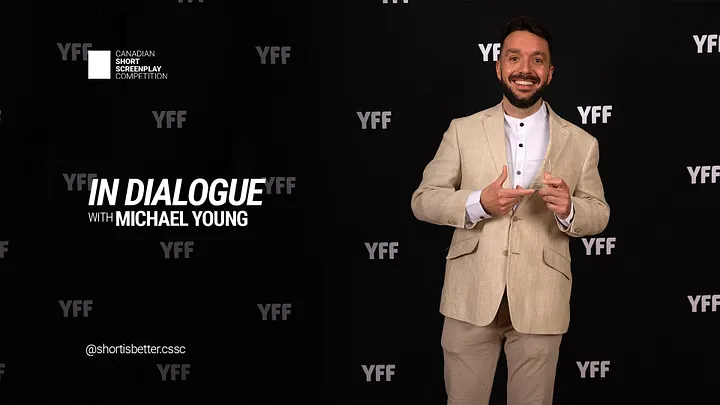Mike Young is a writer, producer and recovering actor based in Toronto. With a love and fascination for the natural world, Mike’s writing tends toward themes of queerness and nature, exploring how queer identity gets shaped by what we consider ‘natural.’
2025 > In Dialogue — Michael Young on Queer Melancholy and Writing What Haunts You
By Canadian Short Screenplay Competition
25 Jun 2025

Michael Young’s Canadian Short Screenplay Competition winning script, The Sound of Trees, was the very last script submitted to the 6th Edition of the CSSC— A haunting meditation on queerness, loss and memory. The piece stood out in this year’s competition for its emotional nuance and time-warped storytelling. We caught up with Mike to talk queerness, short films and the importance of trusting your strangest ideas.
Q: So, what’s the award-winning screenplay about?
A shy teenaged boy follows a handsome young man into the woods where they have sex, but someone sees them. When the handsome young man goes missing, the shy boy fixates on what happened to his love interest. Told over the course of two summers (1992 and 1993) and then decades later, this story is about the things we lose growing up queer, and the journey it takes to find them again.
Q: What drew you to submit to the Canadian Short Screenplay Competition?
MICHAEL: I was excited about a Canadian competition that focuses specifically on short film scripts and that culminates with an in-person event (the Yorkton Film Festival), meaning writers can meet one another.
Q: The Sound of Trees is emotionally rich and thematically layered. What inspired it?
MICHAEL: I’ve always been fascinated by missing persons cases. And I’ve been curious about why I’m fascinated by them. Writing this script was an indulgence into that fascination and one that helped me understand it. Queer people, especially young queer people, often hide themselves to fit in and feel safe. We’re good at pretending to be other people. I think, over time, that brings about a nagging sense of loss; a kind of queer melancholy. This felt sense of loss is then mirrored by a world of physical loss, where generations of queers literally went missing — having run away from conservative households or communities, having been victims of violence, having vanished into cordoned-off hospital wards during the AIDS crisis. To me, there’s a felt connection between queerness and going missing, and that’s what compelled me.
Q: Are there themes or ideas you find yourself returning to in your scripts?
MICHAEL: My screenplays tend toward themes of queerness and nature, and how queerness is shaped by what is considered ‘natural’ or ‘unnatural.’ I gravitate to stories that wander into the darkness a bit, but without losing a sense of humour and an awareness that, ultimately, life is ridiculous.
Q: Can you talk about the writing process? What was it like developing this piece?
MICHAEL: A friend of mine and collaborator gave me a prompt — something to the effect of, ‘a young queer man goes into the woods near his house and something transformative happens.’ I remember musing over it for a while but when I sat down to write, it more or less came out in one go. But I put the script aside for a while — I wasn’t sure if it would resonate or even make sense — particularly the going back and forth between two summers. I wanted it to feel a bit dizzying but not to the point of being frustrating for a reader. I left it for a couple years, though would revisit it from time to time, always feeling a connection to it when I did. Recently, I sat down again to give it a concerted second look — and edit. I cut it down quite a bit to make it eligible for CSSC. In the end, that was a bit of a gift — that pairing back of the script felt like the ultimate edit it needed.
Q: Has being a CSSC Winner had any impact on your career yet?
MICHAEL: I submitted to CSSC at the absolute latest deadline available, so it’s been a quick turnaround (which is to say, nothing major has happened professionally since submitting). That said, being selected as a finalist has been super motivating. Recently, I wrote and produced a series called We Three Queens for OUTtv and that involved so much focus on the production side of things, which pulled my focus away from writing. The CSSC has felt like a really nice and timely realignment with the part of this work that excites me — and that is, writing and developing new scripts.
Q: What creative projects are you excited about right now?
MICHAEL: This month, I’m joining a development team to write a pilot for a new project. I’ve mostly focused so far on developing my own projects, so it’s exciting and new to use my skills as a writer on someone else’s project. Otherwise, I’m continuing to grow my own company, Tender Fruit Productions, writing some new projects to potentially develop, and working on new partnerships for my OUTtv show, We Three Queens.
Q: What’s your advice to other emerging screenwriters?
MICHAEL: Write what you love. Write what fascinates you. Write what you can’t stop thinking about. Don’t write something because you think you should. And don’t not write something because you think you shouldn’t. Don’t worry about making sense of an idea — in my experience, its logic will usually reveal itself to you as you write it. I remember reading or hearing the playwright Young Jean Lee say something about writing your WORST idea. I like that.
Q: Any short films you’ve seen recently that inspired you?
MICHAEL: Gosh, I honestly don’t know. Two that I’ve seen in the past year, which I’ve really liked, are “The First Indigenous Female Pornographer” by Jamie Whitecrow and “The Pros and Cons of Killing Yourself” by a friend of mine, and fellow queer writer, Jaden Curtis.
Q: Is there a quote that resonates with you as a writer?
MICHAEL: “If what we are is entailed in the story we create for ourselves, then only a new story will alter us and our actions. We cannot write a new story. But we can listen for one, once we recognize the need. And if we can side-step the protective barriers of common sense, there is the possibility that we can become fertile ground for a new start, a new story, and a redefining of our place in the world.”
— Neil Evernden, The Natural Alien
Q: Would you consider entering the CSSC again?
MICHAEL: For sure. It’s exciting to have a competition that focuses specifically on short screenplays. Short films feel like opportunities for writers to take risks, and explore themes, characters and stories without as much pressure to end up with something marketable. Obviously, you always want to get your script made and to do that, you have to please producers, financiers, etc. But generally, writing a short film feels more like a thing you do for you — you hope other people like it but you’re willing to take the shot they won’t because what’s fifteen pages anyway? I really like that freedom, and it’s exciting to have a high-calibre competition that focuses on nurturing writers through the short film format.
As our dialogue with Michael draws to a close, what lingers is not just the depth of his storytelling, but the emotional clarity with which he writes. Screenwriting, for him, is less about structure and more about resonance — following the thread of what haunts you, even when it doesn’t yet make sense. His journey reminds us that the best scripts often come from personal questions we haven’t fully answered, and that the quiet courage to sit with discomfort can lead to profound creative discoveries. For writers navigating their own path — whether you’re returning to the page after time away, or grappling with how much of yourself to put into your work — Michael’s story is proof that vulnerability, curiosity and persistence are the truest tools we have. As he so aptly channels through his screenplay, sometimes, the things we lose along the way are the very things we write to find again.
Happy #WriterWednesday.
Submissions are now open for the 7th annual Canadian Short Screenplay Competition until April 12, 2026. Submit via FilmFreeway.
Submit your script to Canada’s top short screenplay competition today!



